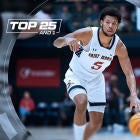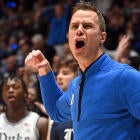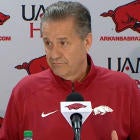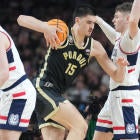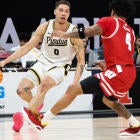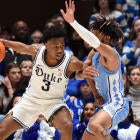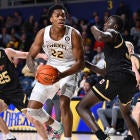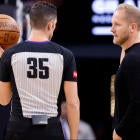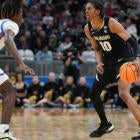More scouting reports: Florida | Kentucky | Wisconsin
When watching a game or looking at statistical trends, we might figure out one or two ways to slow down Wisconsin’s half-court offense or score against Florida’s multiple defenses. But that’s obviously not the whole story. But what about the guys who get paid to break down that stuff; what are they thinking?
During the regular season, we broke down eight potential title contenders, one each week since mid-January. Of course, only one of those teams reached the Final Four. With the four national semifinalists now set, though, it’s time for an in-depth scouting report on each team. I will talk to four or five coaches who played those teams this season, and get in-depth insight into each team.
Can Connecticut win it all? Why is Florida the favorite? And what about Kentucky and Wisconsin? We’ll find answers to each of those questions, and much more.
Style of play
“Guard-heavy, ball-screen offense. They let [Shabazz] Napier make a ton of plays. He’s what makes them go. [Ryan] Boatright is their wild card. They play moderately fast. I wouldn’t say they want to play extremely fast. They’re not great in transition. We ran on them and cut their lead. They rely heavily on the 3, and they have no problem playing slow.”
“They set enough ball-screens to let Shabazz Napier go to work. They become extremely difficult when there’s someone else on the court that is playing at a high level, like DeAndre Daniels is in the NCAA Tournament. He’s a matchup nightmare. If he’s going offensively, he’s long, he’s active and he’s hard to guard. If you’re going to let Shabazz be Shabazz, you can’t let any of those other guys go off. They’re going to try and push the ball, but at the same time, once they have a lead and get in any type of rhythm, they’re going to set continuous ball-screens for Napier in terms of having the proper angles and giving him space to attack. They’re trying to control the pace, whether that pace is pushing the ball in transition or working the shot clock. They can play at various different ways. Kevin [Ollie] does a great job managing in the game how the game is going. He does a good job of controlling the game, and not in a bad way. He coaches every possession without micromanaging. He gets the most out of his guys. He dictates the game from the sidelines in a positive way more than anyone in the country, besides John Calipari.”
“Defensively, they want to get out and pressure you, pressure the guards. They press up on you, not full-court, but in the half-court. They do a good job of mixing up schemes. They’ll guard ball-screens, they’ll switch up ball-screens. They trust their upperclassmen to make some plays. They want to keep their principles, but they make plays. Defensively, they funnel things to their big guys. They press up on your shooters, then funnel you right down to their big guys. Offensively, they push the ball and want to score in transition. Once they get into the half-court, they’ve got some sets, but they’re lethal with the two-man game of Daniels and Napier or Boatright. And they’re making 3s in crunch time.”
Offensive strength
“Napier coming off ball-screens. It depends who’s in the ball-screen action with him. If it’s [DeAndre] Daniels, they can pick and pop, because he can put it down and create mismatches. When it’s [Niels] Giffey, he spaces the floor. If you don’t guard it the right way, and you have to switch, they can pick and pop. And now you have a guy out there that’s not used to guarding one of the best players in the country.”
“What they do well is the players recognize what they need to get in, which is continuous ball screens for Shabazz. Their spacing is not great. At times, they’re bunched up. What they do a good job of is, when you have a group of guys that know who they are and their identity. And their identity is Shabazz Napier. And if they get to the free throw line, they’re impossible to beat. Those guys don’t miss.”
“Ball screens. But they really do a good job of forcing turnovers, with their ball pressure and in passing lanes, they get a lot of easy baskets. They get like, 14 points uncontested. But in the half-court, they’re pretty patient in their offense. And it still comes down to Napier crossing over and hitting a shot with a hand in his face. They find ways to get baskets without dumping it into a post player.”
Key player
“Napier. He gets others involved, so good with ball-screen. He never takes a bad one. He’s constantly putting pressure on the defense. His ability to shoot it from anywhere. I think having Kevin Ollie become the head coach and giving him freedom helped. I think Shabazz really bought in. Before, he had a little ‘city game’ where he felt he could do what he wanted and didn’t want to be coached. Kevin came in and basically told him he could get him to the highest level.”
“He’s as good as any point guard in the country at changing speeds, and controls his speeds better than most guards. He’s hard to stay in front of because of that. Because of his ability to change directions and speeds, that’s what makes him. Another thing that separates him is his ability to shoot off the bounce. He’s as good of a shooter off the dribble as I’ve seen in college basketball. He doesn’t need to be set.”
“You don’t see a really good penetrator that can shoot. And he’s as hot as anyone from 3-point right now. He can get into the lane. Those guys are hard to find. A guy that is so hard to keep out of the paint but also shoot the 3-ball so well, and it’s like the basketball gods don’t permit it. You have to pick your poison. No matter what we did, hand in his face, he still makes shots. The best attribute he has is the ability to make good shots in crunch time. It’s back-breaking and demoralizing.”
Primary weakness
“You can’t let them use their ball screens. Keep them on one side of the floor. If [Amida] Brimah gets in foul trouble. He’s a game changer. You can get the rim when he’s not in there. They have the recipe: shot-blocker, two guards who can get buckets against anyone. And Ollie’s limited his rotation. Guys know their roles now. They’re better defined.”
“Their biggest weakness is you can attack them. You can beat them off the dribble. Their pressure allows you, if you have proper spacing, to spread them out and get into the heart of it. Their bigs don’t move their feet well. You can go right around those guys. Which poses a lot of problems against Florida’s bigs.”
“They don’t have a real post threat. And I do think if you’re physical with Daniels, he won’t go in the post. They lack a true post presence. I think defensively, they give up penetration way too easily. Because Napier and Boatright are playing the whole game, they can’t deliver that energy on both ends of the floor. And they have to be careful with the new foul rules.”
How to stop them
“Any screen with the five man, you drop your big, make Shabazz throw the ball to their five man and make it hard to get it back to him. You want their four and five men to touch the ball as much as possible. It limits their playmaking ability. When Shabazz gets into the paint, he’s as tough as anyone in the country. How many times Napier and Boatright touch the paint is key.”
You have to trap the ball screens to get the ball out of Shabazz’s hands. We were trying to keep the ball on the sideline. You don’t want anything to go down the middle. Icing the ball screens. Keep it on the side of the floor. Don’t allow middle penetration. The one thing with them is Shabazz is going to beat the first line of defense. With Florida’s bigs, I don’t think he’s going to be able to get going. He’s not as good as a finisher as some people think. DeAndre is a better finisher than him. Length bothers him sometimes.”
“Be physical without fouling. I think clearly if you can find someone with decent quickness, with some size on Napier, he would have a tough time. I you’re thinking of holding him to 10-12 points, it’s not going to happen. He’s lethal from the foul line, and he’s going to get fouled. Be physical with Daniels, it changes the way those two play, especially Daniels. Isolation and the shots they make over extended arms hurt us.”
Best way to score on them
“Get them in transition some. Make some 3s. They’re going to sink in on the weak side, so get some ball reversal, move them side to side. Don’t just take a 20-footer off one or two passes. Screen them.”
“You gotta beat them down in transition. We looked at doing that, and if you beat them before they get set, they’re not great getting back on D. Exploiting them in transition. Once you do have them in the half-court, you really need to set continuous ball-screens against them, just like they do to you. Once you beat that first line of defense, you can attack. And you can go after Shabazz Napier because he’s small.”
“Penetration. If you do have a post presence, those big guys are foul prone. But those guards are trying to stay out of foul trouble. And since they are pressuring, there are large gaps, but they try to funnel you into the big guys. So you have to attack.”
Ultimate concern
“Stop the ball in transition. Make them play against five defenders. Cut off driving lanes. Make them take contested jumpers. We would concede that. When we played them, DeAndre Daniels, we picked our poison with him. He wasn’t playing well. But you’re not letting Napier get going. He’s a threat to get a triple double every night. Some teams let him score and the other guys get disinterested. Limit penetration or let Napier score. Make him finish over body-to-body contact. Sometimes the ball stops with him.”
“If Napier becomes unconscious. Those first few minutes of the game. He scores in bunches. He can knock down 3s right in your face and suddenly you’re down double-digits. You have to control him, and limit DeAndre Daniels and not let him get off. Boatright is going to get his 10 points a game, but he’s not much of a threat [as Daniels]. If he’s making shots, he’s hard to guard.”
“Napier. He just makes huge shots. He legitimately demoralizes you with his timely shots, and they’re such tough shots. You have to stop him first. I was really impressed with their energy. They maintained their energy throughout the game, and those big three play a lot of minutes. Their energy and their composure.”
DeAndre Daniels as the X-factor
“I think he’s a big-game player. He likes when the pressure is on. He’s dangerous because he’s very skilled and can score in a variety of ways. He’s not a guy who puts it down without looking at the rim. He’s going to shoot it, or pick and pop. Feel-good type of player. Big momentum guy. That’s why they’re in the Final Four.”
If DeAndre Daniels gets it going, that’s where they become a really lethal team. It’s the first five minutes for him. He’s a confidence guy. There’s kind of a feeling you get when you play him, that when things are going well, he’s effective and a front runner. When things are going bad, he’s not very good.”
“He’s really versatile because he can shoot and he can post and he can put it on the floor. He’s one of their best 3-point shooters, and if he’s got his post game, he’s impossible to guard. And he’s only 195 pounds, but he put a couple of our guys in the basket. He’s got a fadeaway that’s almost unguardable. You can be physical with him though.”
Big enough to win a title? Supporting cast good enough?
“That’s the biggest concern. Can they win back-to-back wars? If they get past Florida, it’s Kentucky or Wisconsin, and they’re both big and athletic. They’re deep, and they’ve done it all year. They’re battle-tested. If [Phil] Nolan and Brimah can be productive, I think they have a great chance to win the game. If they struggle and you got other guys playing because of foul trouble, that’s not a good recipe. There’s a lot of different X-factors in that game.”
“That’s the thing I fear for them the most. Once Shabazz is gone, what’s the next chapter? They have one guy who has carried them to a Final Four. And their bigs aren’t up to UConn standards. Brimah is good, he’s better than I thought he would be. But he’s not UConn good. He’s got similarities to [St. John’s center] Chris Obekpa. Limited offensively, but defensively, he can make a play. He’s long and big.”
“I do. Their bigs play a pretty good role. Brimah with the blocked shots, Nolan is pretty physical. They roll 7-footers off the bench. They roll hard, they suck the defense in. And as good as Napier is playing, those other two – Daniels and Boatright – are playing at a high level too. You would almost call them the big three.”













